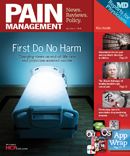Publication
Article
Pain Management
Opioid Addiction and Dependence: PAs want to provide hospice care, prescribe buprenorphine
As part of the American Academy of Physician Assistants' (AAPA) Leadership Forum, 200 physicians assistants took to Capitol Hill to drum up support among members of Congress for "removal of barriers for PAs" that AAPA believes will help their members "meet the demands of a 21st century health care system."
As part of the American Academy of Physician Assistants’ (AAPA) Leadership Forum, 200 physicians assistants took to Capitol Hill to drum up support among members of Congress for “removal of barriers for PAs” that AAPA believes will help their members “meet the demands of a 21st century health care system.”
AAPA is pushing for changes that would:
- Allow PAs to provide hospice care for Medicare beneficiaries;
- Amend the HITECH Act to extend Medicaid EHR incentives to all PAs who meet the required threshold of care for Medicaid beneficiaries;
- Amend federal law to allow PAs to prescribe buprenorphine for opioid addiction.
“It just makes sense to promote a teambased model in which patient care can be strategically coordinated, reducing the burden of unnecessary testing and treatment on patients and the health care system as a whole,” said AAPA president Patrick Killeen. “The removal of these barriers to care will allow PAs to infuse our health care system with much-needed medical expertise as we shift into new models of care.” http://HCP.LV/gM4HwO
Special Issue of Neuron focuses on addiction
The February 24 issue of Neuron, dubbed “Reviews on Addiction,” presents a host of research and commentary that will “provide insights into how research has shaped our understanding of the neural underpinnings of addiction and led to more informed treatment strategies, while more societal-focused NeuroViews further highlight the complexities associated with substance abuse and ways in which the field is moving toward addressing such issues.”
The issue is accessible free of charge.
Highlights include a podcast interview with Nora Volkow, MD, director of the National Institute on Drug Abuse, “where she discusses her views of addiction research and policy with Neuron senior editor Kris Dickson;” an essay by Harvard Provost Steven Hyman, MD, in which he dissects the “promises and perils” inherent in the development and use “of biotechnology (drugs, stem cells, brain-machine interfaces) to enhance human cognition, emotion, and executive function…”; and a report detailing how “drug-evoked synaptic plasticity, which outlasts the presence of the drug in the brain and contributes to the reorganization of neural circuits,” may contribute to addictive behavior “with repetitive drug exposure.” http://HCP.LV/gq2BKk






